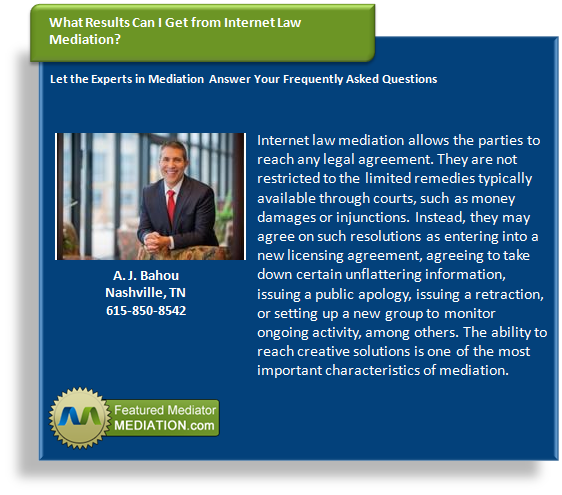The Mediation of Claims Involving Computer and Software

Every day, we rely on computers, software, and applications to help us accomplish our daily job duties and goals. However, issues with computers and software can cause disruption to a business, leading to disputes with customers, competitors, and employees. Due to the potential privacy concerns involved with these matters, mediation is an effective alternative to litigation that allows the parties to take control of their case and avoid the often unsatisfactory results that follow litigation.
Mediation is a form of alternative dispute resolution that differs significantly from litigation. In litigation, the parties are adversaries and participate in a contentious process. In the end, there is a clear winner and loser.
In contrast, mediation gets the parties to work together toward a mutual goal of avoiding the expense and time of litigation. Both parties are able to emerge from this process in a position of strength.
Additionally, they can avoid the often surprising results that arise when allowing a judge or jury to make a binding decision on them. Additionally, parties can select their mediator, so they can choose someone with subject matter expertise on issues involving computers, software, and technology. This also allows them to skip the time of having to explain complex, technical issues to lay juries or having to hire expert witnesses to try to explain them.
Mediation involving computers and software may occur in person, or the parties may leverage technology further by having online mediation in which the parties participate through videoconference software. They can virtually distance themselves in this way. If they reach an agreement, they sign it and have their binding contract as a result. They can ask the court to approve it and incorporate it into a court order.
Effective Techniques to Mediate a Cybersecurity Issue

Cybersecurity matters are almost always complex. They may involve very technical details, as well as a party that has intentionally negatively affected a business through hacking or other illegal conduct. Resolving these issues may be possible through mediation and the implementation of the following steps:
Define the Problem
The first step is to accurately define the problem. Cybersecurity issues may arise when a hacker steals information. The parties involved may need to accurately reflect on whose information was stolen and the potential impact of this theft. It is also important to note whether other data may have been damaged or destroyed.
 Review Contract Provisions
Review Contract Provisions
If the issue involves insurance coverage for a data breach, it is important that the parties carefully review the terms of any relevant insurance contract. In other situations, other agreements may apply, such as nondisclosure agreements, terms of use agreements, or other agreements that establish the rights and responsibilities of the parties.
Consider Possible Implications of Effects of Other Laws
While the parties may be focused on their more narrowly defined issue, it is important that they also consider whether other laws may be implicated and whether these laws may affect their claim if the matter is publicly disputed. For example, HIPAA, the Fair Credit Reporting Act, consumer protection laws, or privacy laws may be involved in the case. By privately resolving the matter, the company may be able to avoid adverse regulatory action.
Protect Your Interests
When dealing with a cybersecurity issue, it is important that you carefully consider how the current issue may affect you and your business. If a matter is publicly litigated, it may lead to negative publicity and make customers doubt your ability to safeguard their data. Additionally, it may further highlight security vulnerabilities that others may be able to take advantage of.
An experienced mediator will help to identify your underlying interests and also inform you of the possible consequences of continuing in protracted litigation. This information is often enough to help parties embrace the mediation process and reach a resolution that is targeted at helping them protect their interests.
Miriam Rich
Benefits of Mediating Elder Abuse Cases

Elder abuse is a serious problem that affects millions of Americans. It is believed that instances of elder abuse are drastically underreported. When a loved one is concerned about their loved one being abused or neglected they may immediately jump to litigation. Mediation is a viable alternative that offers many benefits to parties, including:
Privacy
Mediation is a private process. It is not conducted in an open forum like a court case is. It is also confidential, so the parties do not have to worry about what they say being used against them later in court. Privacy helps to protect the loved one, as well as the nursing home, which can avoid negative publicity. It also facilitates open discussion so that the parties can clear up misunderstandings.
Faster
Mediation can be scheduled based solely on the parties’ and mediator’s schedules. Parties do not have to try to add their names to an exhaustive court docket. By resolving disputes faster, the parties are often able to minimize damages and preserve relationships.
More Affordable
A lot of expenses go into litigation, including:
- Court costs
- Attorney fees
- Discovery costs
- Expert witness fees
These sums can result in significant costs to both parties.
In mediation, the parties can often minimize their costs. They may not incur filing fees if they immediately seek resolution through a mediator and bypass the litigation process. Additionally, they can split the cost of mediation.
Preservation of Relationships
Mediation is often able to help the parties maintain a civil relationship with one another. Unlike in litigation where the parties are pitted against each other, the parties work together in mediation to come up with possible solutions to their shared legal problem.
Creative Solutions
In mediation, the parties are often able to brainstorm creative solutions to their legal problem. They are not restricted like they are in litigation to money damages or other limited forms of relief.
Lisa Kline Goldstein
Mediating Nursing Home Cases: What to Expect

Mediation is a legal process that helps parties embroiled in a dispute work together to resolve the issue, effectively taking the power from the court and placing it squarely in the hands of the parties involved in the dispute. Because of the many benefits of mediation, including the cost and time savings, mediation is increasingly being used by more parties, including nursing homes and disputants. Here is what you should know about mediation in this context.
Types of Nursing Home Cases that Can Be Mediated
Many different types of disputes that occur within the nursing home context can be effectively resolved through mediation. One of the few requirements is that the parties be willing to use this method and participate in good faith. Mediation has successfully resolved cases involving:
- Billing disputes
- Disputes over care provided or withheld
- Services
- Employment disputes
- Concerns regarding abuse or neglect
The Process of Mediation
The parties usually voluntarily agree to mediate the claim. They will agree on a mediator, usually someone with experience involving nursing homes or personal injury cases. The mediator explains the ground rules of mediation, describes its benefits, and helps guide the parties’ communication.
Mediation is confidential, so the parties often feel more comfortable freely expressing themselves without worrying about hearing what they say repeated in court. This open communication can help clear up misunderstandings and also allow the plaintiff in the case to freely express their concerns, an opportunity not usually afforded within the civil litigation process.
The parties work together to reach possible solutions to their legal issue. If the parties cansettle, the mediator draws up a written agreement to this effect.







